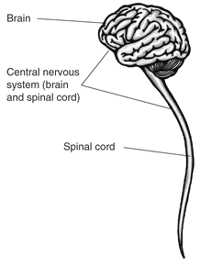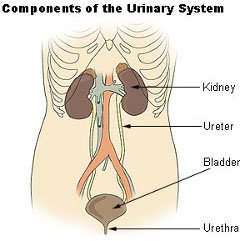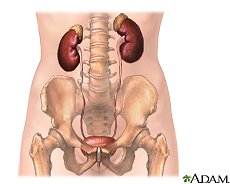Disclaimer: This page may contain affiliate links. We may earn a small commission for purchases made through links in this post, at no extra cost to you.
Bladder Problems

Bladder problems, also called bladder dysfunction, occur in at least 80% of people with multiple sclerosis. The problems common to MS are a direct result of lesions along the central nervous system (CNS), specifically along the spinal cord that connects to the urinary system. Where the lesions occur can cause any number of problems with any one of the following parts of the urinary system. Basically it is made up of the following parts:
- Kidneys
- Ureters
- Urinary bladder
- Urethra
Kidneys
Most of us have two kidneys, although some are born with only one. The kidneys primary function is to act as a filter for our blood. They remove the bad stuff, such as toxins from the blood stream and also balance the fluids (water and electrolytes) within our bodies. Once the impurities are removed from the blood they're excreted into the urine.
The kidneys are two bean-shaped organs that are located just below your ribcage and behind your abdomen, one on either side of your spine. They are between your intestines and your diaphragm.
Each kidney is about 4 to 5 inches long and about the size of a fist. Your right kidney may weigh a little more than your left. They filter about 200 quarts of fluid everyday. That's about enough to fill a bathtub. We usually pee about 2 quarts of urine per day. The other 198 quarts are recycled.
The renal artery, a large blood vessel, carries blood into your kidneys where tiny blood vessels filter it. The cleaned and filtered blood goes back into the bloodstream through another large blood vessel called the renal vein.
Ureters
From each kidney, urine travels through a ureter or a small tube of muscle which is connected to your bladder. Once there it is stored until you are able to release it by urination.
Urinary bladder
Your bladder is a triangle-shaped, hollow organ which holds the urine until your body signals it's time to void or urinate. It's located in your lower abdomen or pelvis. The walls of the bladder relax and expand to store urine and contract and flatten to empty the accumulated urine through the urethra. A healthy functioning bladder can store up to 2 cups for about 2-5 hours at a time.
Urethra
The urethra is the single tube that transports the urine containing all of the toxins and bad stuff out of your body. As mentioned earlier, the brain signals the bladder muscles to tighten. When this happens, urine is pushed out of the bladder when the brain signals the sphincter muscles to relax so that urine can pass through the urethra.

When there are no bladder problems
Now that you have the basics, lets talk about the actual process. When there are no problems with your bladder and everything is working perfectly, several things have to happen at the same time.
The detrusor or bladder muscle has to contract to expel urine. At the same time the internal and external sphincters need to relax. Urine will then be able to pass freely out of your body.
When the urinary system is functioning normally urine is collected slowly. And the bladder slowly expands. When there is about 6-8 oz. of urine, the nerves kick in. Nerve endings inside your bladder send a message to the brain. "It's time to urinate."

The brain sends a message back to the spinal card. It signals the voiding reflex to contract the detrusor or bladder muscle and relax the urethral sphincter, allowing you to urinate.
This urinary symphony can only happen when the whole orchestra is playing in complete harmony and every musician is focused and watching the conductor. At the very least, there are three things that can go wrong when you have MS.
Bladder Problems
The following are bladder problems that can happen when you have multiple sclerosis.
- Failure to store
- Failure to empty
- Combined dysfunction
At first glance, they may seem pretty straight forward, however, we'll dive a little deeper into each one of them on the next page. The first one, failure to store, is probably more likely to occur and causes a sense of urgency where you feel like you have to go all the time.
The second one, or a failure to empty, occurs when you feel like you have to go, but can't. This can be very dangerous as you can probably imagine. It's something we found out when Cir ended up in the ER with this very problem. He was whisked into a room and immediately x-rayed, or it could have been an ultrasound, only to find out that his bladder had stretched to an extremely large size.
An indwelling catheter was inserted and the problem was resolved temporarily. You'll learn more when you go to part 2. The third problem, combined dysfunction, is where you have some form of both problems at different times. As mentioned at the beginning of this page, at least 80% of people with MS will have some type of bladder dysfunction, this according to the National MS Society, (link opens a new window).
To find out more about each of the 3 problems above, go to Bladder Problems - Part 2.
Go back to Multiple Sclerosis Symptoms
Go to Part 2
Go to Part 3
Dear Friends,
"Life in Spite of MS is a participant in the Amazon Services LLC Associates Program, an affiliate advertising program designed to provide a means for sites to earn advertising fees by advertising and linking to Amazon.com. We're also part of the Ebay Partner Network, another affiliate program."
We'd also like you to know it doesn't cost one cent more when you click through the links here on our blog. Not one single penny. And we will make a little extra cash when you do click through. We'll be ever so appreciative. You also have our word that we'll only link to things that we would use ourselves, (or wish we could have or use).
Sincerely,
Cir & Akrista
You are reading original content written by Akrista or Cir L'Bert of Life in Spite of MS. If you enjoyed reading this blog, please consider following us on Facebook, Twitter, Pinterest, and Instagram. See you there!
Privacy Policy ~ Advertising Policy ~ Disclaimer ~ Contact Us ~ About Us

New! Comments
Have your say about what you just read! Leave me a comment in the box below.